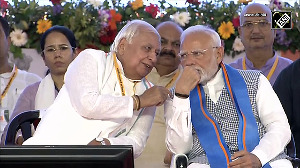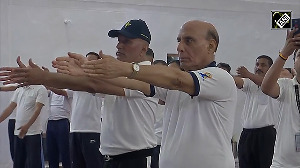Telephone Regulatory Authority of India's decision not to give permission to political outfits to launch satellite channel has come as a dampener for many parties, which were planning to enter the television arena ahead of the next year's general elections.
Several state governments, including Delhi, Tamil Nadu and West Bengal, and political parties had approached the Ministry of Information and Broadcasting seeking permission to start their own television channels or radio stations.
The ministry in turn sought TRAI's opinion on the issue, which refused the proposal recently, a move strongly opposed by the political parties who termed it as 'undemocratic'.
Political parties in the country, especially in southern states, have been vying to reserve a place for themselves in the satellite television arena -- a sure shot way of reaching the drawing rooms of millions of people.
Channels like Kalaingar TV and Jaya TV in Tamil Nadu, Kairali TV of Kerala and Chobbish Ghonta of West Bengal associated with Dravida Munnetra Kazhagam, All India Anna Dravida Munnetra Kazhagam and the Communist Party of India-Marxist respectively, often function as mouthpiece of the outfits.
Reacting to the TRAI's recent decision, BJP leader Prakash Javdekar said: "I don't approve of the TRAI order for prohibiting state governments to launch their own satellite channels. Their expulsion is for superfluous reasons as many political parties continue to run channels under the guise of a company."
CPI-M senior leader Nilotpal Basu accused the TRAI of being keen on protecting the interests of the media corporates.
"If central government can have a broadcaster in Prasar Bharati then why prohibit state governments," he asked.
A representative of the Tamil Nadu government argued before the TRAI while presenting its case, that in certain countries political parties and their candidates are given the opportunity to air their ideologies and to campaign during elections through television channels.
The Cable Operators Federation of India along with the Tamil Nadu government stated that state governments, political parties and religious organisations should be allowed to enter the broadcasting sphere as it would improve livelihood of cable operators and reduce monopoly of private MSOs.
The Tamil Nadu government already runs Arasu Cable TV Corporation and almost all the satellite channels which air news bulletins in the state are identified with political parties.
However, TRAI says that it is following recommendations of the Sarkaria Commission which held that allowing political parties to launch satellite channels will lead to erosion of basic tenets of plurality of views.
"Manifesto presentation and electoral campaigning were the two reasons for which political parties sought space in the media sphere. But in a country like ours where a majority population is illiterate, it was considered best to uphold the recommendation of the Sarkaria Commission," TRAI secretary R K Arnold said.
Stakeholders pointed out before TRAI and I&B ministry officials that several developed and developing countries prohibit political parties from the broadcast sphere.
Consumer activists pointed out that that since political parties are already backed up by certain entertainment and news channels, a separate venture for them would merely add to the list of existing channels.
On reasons behind prohibiting political parties to launch their channels, a senior I & B ministry official said, stakeholders argued that allowing state governments will let political parties in power to voice their opinions through such organs of the state government.
"It was pointed that this will result in loss of public funds," he said.
Representatives from most television channels voiced their strong resentment against allowing state governments in the media sphere.
The TRAI while emphasising the importance of free flow of information to the public during electoral process specified in its final recommendation that it is necessary to mandate that broadcasting stations provide 'reasonable access' to recognised political parties during the run up to Parliament and state assembly elections.
While reasonable access to political parties should be provided free of cost by the public service broadcaster, Prasar Bharati, the Ministry of I & B was asked to seek guidance of the Election Commission of India for framing guidelines on the compensation payable by the political parties to broadcasting channels for use of airtime, TRAI said.






